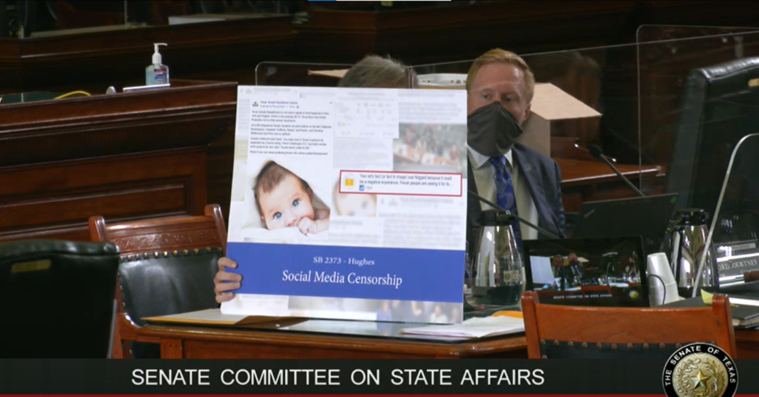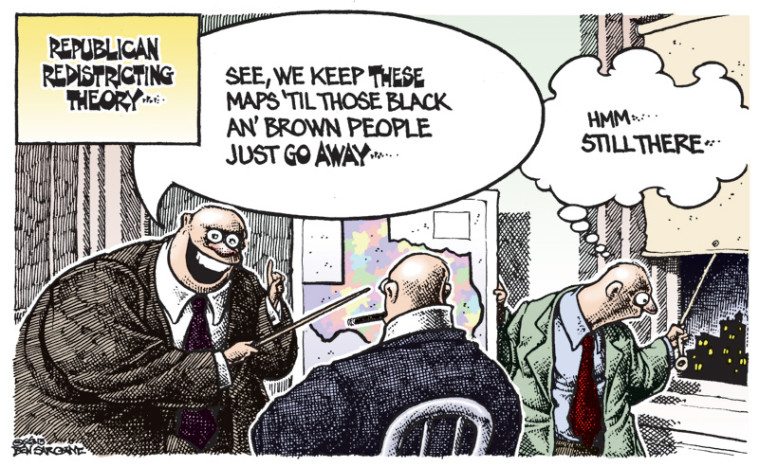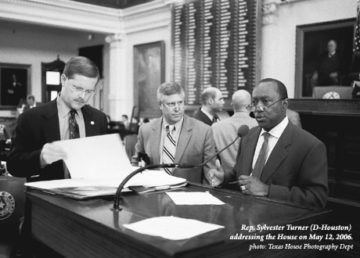Welcome to the 87th Legislative Session. Since the last session came to a close in June 2019, Texas has been hit by an unrestrained pandemic and a crippling economic crisis—and now the fallout from deadly blackouts. Under unprecedented circumstances, lawmakers are faced with a number of urgent challenges. The Texas Observer is following along every step of the way.
Go here for last week’s dispatch from the state Capitol.
What We’re Following:
Texas has many problems. The COVID-19 death toll is nearing 50,000. Four out of five people remain unvaccinated. When it gets very cold, the state cannot keep the lights on. All that, and conservatives are having their Facebook posts flagged or even taken down.
If you think that last item doesn’t fit, that’s why you don’t chair the Texas Senate’s Committee on State Affairs, one of the upper legislative chamber’s most influential bodies.
On the Senate floor Monday, Chairman Bryan Hughes, R-Mineola, laid out his Senate Bill 12 — a measure that would empower individuals, or the Texas attorney general, to sue large social media companies for “censoring” users based on the users’ “viewpoint.” The bill would also require companies to publicly disclose content moderation practices.
The proposal has support from top GOP brass: Lieutenant Governor Dan Patrick has identified it as one of his 31 priorities for the year, and Governor Greg Abbott—eager to appease a restive base and apparently with nothing more pressing to attend to—held a news conference last week to promote the bill. “Conservative speech will not be cancelled in the state of Texas,” the governor vowed. (The governor also recently condemned the social media site Gab, which was founded as a free-for-all alternative venue for conservatives. Consistency has rarely been Abbott’s strong suit.)

On Monday, the committee spent an hour swapping war stories from the culture front. At one point, Senator Hughes whipped out a large print-out of a 2019 anti-abortion Facebook post from the Texas Senate Rupublican Caucus that was flagged and limited by Facebook. The social media company has said it penalized the post because it was “clickbait,” but two years later Hughes seemingly still views the move as grievous censorship.
The hour’s most passionate witness was Paul Anthony Hale, who identified as a resident of Cass County but did not offer other credentials on the matter at hand. “[Big tech companies] have been very successful in proving just how much they hate America,” Hale said. “A grim reminder is given daily as we witness big tech companies take part in the hideous cancel culture, siding with anything and everything that is downright evil.”
Hughes, who said he’d previously spoken with Hale about the topic, prompted Hale to share his personal posting tribulations. Hale specified he’d had only one social media post flagged, wherein he had asked regarding COVID-19: “Why was this manmade disease manufactured?”
On the other side of the issue, Steve Delbianco, president of the big tech association NetChoice, testified that SB 12 would likely fall to a legal challenge, if passed. Per the First Amendment, he argued, the government cannot generally force private actors to “carry” or publish certain speech.
The bill was left pending in committee and will likely be voted on later.
As for other matters, the Senate’s committee on redistricting launched 3 days of hearings on Thursday—in preparation for the task of redrawing the state’s electoral maps once Census data is available—and House Speaker Dade Phelan has announced seven priority bills to reform the state’s electric system.
What We’re Reading:
Finger-wagging, but no oversight, for Texas redistricting (2019)
Thanks to a disastrous failure by Texas Democrats to make inroads in the state House last November, Republicans will have a free hand once again this year to gerrymander themselves into power for the coming decade. Oh, and for the first time in almost half a century, they’ll be doing so without federal oversight. Staff Writer Michael Barajas explained in 2019. / Texas Observer
Or, if you’re more of a visual learner, here’s a 2013 cartoon from Ben Sargent.

After the blackout crisis, Texans could be paying for decades to come
For Texas Monthly, Loren Steffy writes: “Whatever the market looks like as the fallout from the 2021 freeze-out subsides, though, it’s likely to be more costly, offer fewer consumer choices, and require more government oversight—the very opposite of what deregulation was supposed to deliver.” / Texas Monthly

Deregulation was supposed to lower Texans’ electric bills. Instead, rates are through the roof. (2006)
They say hindsight is 20/20. But, sometimes, foresight is alright too. Here, former Observer editor Forrest Wilder outlines the folly of deregulating the Texas energy system in—*checks date*—2006. / Texas Observer
Bipartisan legislation filed to legalize casino gambling, sports betting in Texas
A Republican and a Democrat walk into a bar, and push to legalize gambling in Texas on behalf of a dead man. Or something like that. From one side or another of the needle’s eye, billionaire Sheldon Adelson is surely watching, more or less camel-like, as Representative John Kuempel, R-Seguin, and Senator Carol Alvarado, D-Houston, carry on his campaign to expand vice in Texas. / Dallas Morning News
All Hat, No Cattle
The Texas Legislature is known for its outlandish members, ludicrous antics, and right-wing flare-ups. Here’s your weekly dose.
It’s still early days for the Texas Legislature, but one man has already earned a repeat appearance in this category: Representative Bryan Slaton, the freshman Republican from Royse City.
Slaton had already distinguished himself with a childish proposal to rename a stretch of IH-35 in Austin to the “Steve Adler Public Restroom Highway”—an anti-homeless witticism he then took pains to explain to a local newspaper reporter. Since then, he’s kept the pedal to the floor.
Last Thursday, Slaton filed a bill that would have the state take responsibility for finishing the border wall that Donald Trump started. It would even name the wall after the former president. President Biden has currently paused wall construction, and South Texans are awaiting the administration’s plans. In most cases, Trump never actually finished taking Texans’ land for the wall through eminent domain. The exact logistics of Slaton’s proposal are unclear, but one way or another he wants the government to finish confiscating Texans’ private property for the wall, and—inverting an old Trump slogan—he wants Texas to pay for it.
For good measure, Slaton then filed a bill that would make abortion punishable by death. Another man, Representative Tony Tinderholt, has tried this in recent years. The bill goes nowhere, though it has caused both Tinderholt and his opposition to face threats from the public.
In all, Slaton looks like the leading candidate to fill the shoes of ex-Representative Jonathan Stickland, the Bedford Republican who was known for his provocative antics, obstructionism, and overall ineffectiveness. We’ll just have to wait and see, though, whether Slaton ever takes to identifying himself as a “former fetus,” and whether he can beat Stickland’s record of one bill passed in six years.







